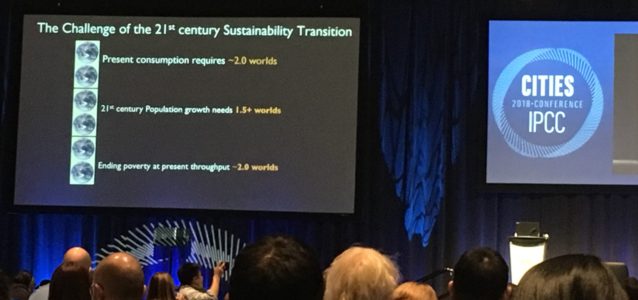“If the answer to climate change in cities is about a better understanding of policy, values and justice, should we be looking to IPCC for information? Will data and technology give us the answers?”
The intervention above one was of the more poignant offered during the Intergovernmental Panel on Climate Change (IPCC) conference on climate change in cities (Edmonton, Canada, 5-7 March 2018). More than 650 participants attended, with academia comprising 60% of this audience and practitioners the other 40%. The many participants from Africa, Asia and other less developed nations who could not acquire visas in time were sorely missed, and this bias was clearly voiced on the first day and beyond.
The conference covered four themes related to climate change and cities: i) cities and climate change (imperatives for action); ii) urban emissions, impacts and vulnerabilities (science and practice of cities); iii) solutions for the transition to low carbon and climate resilient cities (science and practice for cities); and iv) enabling transformative climate action in cities (advancing science and advancing cities). From a personal perspective, which is embedded in the context of Future Resilience for African CiTies and Lands (FRACTAL), I am far less excited about the key points distilled from plenaries and sessions than I am about the grumblings amongst the crowd, adamant to acknowledge and express the points that I’ve summarised below (in no particular order).
To date, our responses to Global Environmental Changes (including climate change) have been trivial.
Mature cities have developed in an exclusive, inefficient and destructive way, and now need to implement extreme measures to curb emissions and increase adaptive capacity. Younger, growing cities should not strive for similar development or “lock in” to similar trajectories and lifestyles. Instead, these cities should implement a different, more cautious agenda that focusses on resilience and wellbeing of inhabitants, mindful of the mistakes that have been made by already developed cities. In a way, there are far more opportunities for effective responses to climate change in these underdeveloped cities.
Informality is, and always will be, a big part of cities; this requires a different way of studying and working in cities. The “global south”, with relevant experience, should lead this research agenda.
We need to be able to work within and understand cities as complex systems of cultural, physical and social variables instead of sectors or silos; both the research and practitioner community has a long way to go in this regard.
Although necessary for increasing efficiency, new data, information and technology will only get us so far. As our controversial colleague Bill Rees (father of the “ecological footprint” notion) reminded us, data and technology have enabled our current rate of consumption and production and hence, our crisis. If we chose to rely on these tools going forward, we are simply looking for more efficient means for the same gross patterns. To solve the problems associated with climate change we need transformations in values, systems and behaviour. To do this, we need to be thoughtful and bring environmental and social justice into the heart of the response instead of data and technology.
We need new ways of producing solutions that recognise and integrate multiple knowledge types, and must be prepared to have difficult conversations that include every age, race and gender. This was identified as a need during the session on the future research agenda for cities science. During another session, a group of youth representatives from around the world delivered their white paper and supporting artworks on climate change action in cities, during which a member of the IPCC scientific steering committee requested collaboration with the group to translate IPCC outputs into accessible material.
Disappointingly, little emphasis was placed on climate science and the difficulty of using this information at a city scale; a topic with which we grapple in the FRACTAL project. But perhaps the meta-themes presented above will pave the way for such discourses.
An undertone of anxiety, or at least urgency, spanned the three days of the conference. We are extremely tardy (potentially too late) in beginning these conversations, and building incremental resilience is no longer an option. In places like Oslo, Norway, transformative responses might be possible. Indeed, the mayor of Oslo explained her plans to reduce 95% of emissions from the city by 2030 in one of the conference plenaries. However, in developing cities with comparatively extreme political and socio-economic complexity such as my home in southern Africa, such responses are more challenging.
As usual, the conference sparked more questions for me than provided answers, and the anxious undertone has remained with me alongside the excitement as I’ve begun my travels back to South Africa, wondering… Will complacency always override the imperative to critically reflect on our values and views of success? Will economic growth continue to override the notion of wellbeing despite the obvious damage of this western ideal? Are our leaders, practitioners and researchers creative enough to imagine different futures, and fervent enough to fulfill this agenda?
To read official feedback from the IPCC, follow the conference website.
